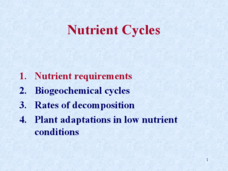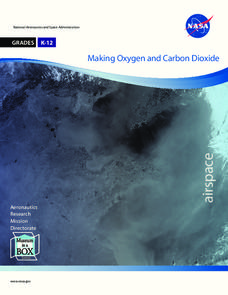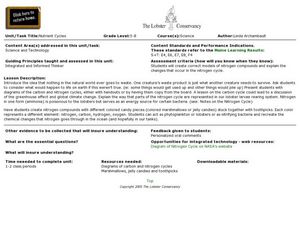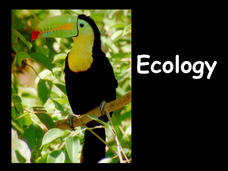Curated OER
The Carbon Cycle
Here is an interesting science lesson plan. Pupils discover that carbon, just like water, is absolutely necessary for all living things to survive. They study how it cycles through nature, become familiar with the periodic table, and...
Curated OER
The Water Cycle
An inventive and interesting instructional activity on the water cycle (and other cycles associated with it), is here for you. After doing a well-designed hands-on inquiry in class, learners also identify organisms and processes that are...
Curated OER
The Biogeochemical Cycles
The majority of this presentation is a collection of diagrams and graphs that back your lecture on biogeochemical cycles. The last few slides define ecosystems and the Gaia hypothesis. You may find these slides valuable, but will...
Curated OER
The Water Cycle
Fifth graders identify organisms and processes involved in three cycles: the water cycle, the carbon cycle, and the nitrogen cycle. They produce a pictorial or abstract water cycle, and appropriately place life forms onto an existing...
Curated OER
The Hydrologic (Water) Cycle
Learners construct a model of the hydrologic cycle, and observe that water is an element of a cycle in the natural environment. They explain how the hydrologic cycle works and why it is important, and compare the hydrologic cycle to...
Chicago Botanic Garden
Greenhouse Gas Emissions — Natural and Human Causes
What impact do humans have on greenhouse gas emissions? What are the natural causes of these gasses? Thanks to the carbon cycle, carbon dioxide eats away at the earth's atmosphere with the intensified help of humans. Young scientists...
Curated OER
Nutrient Cycling
AP environmental science or college-level ecology classes will glean a tremendous amount of information on nutrient cycles from this detailed PowerPoint. It covers nutrient requirements, biogeochemcial cycles, decomposition rates, and...
Curated OER
The Water Cycle
Fifth graders explore the major components of the water cycle. They pay close attention to evaporation, condensation, and precipitation. A water cycle kit is set up in the classroom, which learners observe for a couple of days before the...
Curated OER
The Carbon Cycle
Fifth graders examine the carbon cycle, periodic table, and photosynthesis and respiration. They analyze the periodic table and how it is organized, then complete the "Elementary, Dear Watson" worksheet. Students then examine a carbon...
NOAA
The Biogeochemical Cycle
The biogeochemical cycle ... no physics? The fourth installment of a 23-part NOAA Enrichment in Marine sciences and Oceanography (NEMO) program introduces the biogeochemical cycle by having pupils simulate movement between Earth's...
Curated OER
Resources for Teaching about Biogeochemical Cycles
Students study the different cycles and Earth's systems. In this investigative lesson students study the nitrogen and carbon cycles, play a game pertaining to it and also participate in a class activity.
Curated OER
Moebius Strips
Students make Moebius strips and use them to demonstrate the interconnectedness of an environment. They explore the natural cycles (water, oxygen/carbon dioxide, carbon, nitrogen) within the environment. They describe how the cycles are...
Curated OER
Ecology
For use early in the year with your ecology class, this collection of slides introduces viewers to cycles in nature and relationships between organisms. There is a food web diagram, but the presentation is incomplete without any diagrams...
Curated OER
The Nitrogen Cycle
The nitrogen cycle is the focus of a well-designed science instructional activity. In it, learners see that plants and animals produce waste products and decompose after death. Many of the waste products include nitrogen which is absobed...
Curated OER
Energy Flow Through Ecosystems
Middle or high school environmental studies classes will learn much from this presentation on energy in ecosystems. It covers the foundational topics of trophic levels, food webs, and nutrient cycles using informational text and...
Curated OER
Ecological Cycles Part 1
Knowing about the hydrologic cycle is the first step to understanding the carbon cycle. Upper graders discuss the earth's water content, polar ice caps, and the concept of the ecological cycle as it applies to carbon, nitrogen, and other...
Virginia Department of Education
The Cycles of Nature
Encourage peer collaboration and assist with the creation of visual aids to identify carbon, water, and nitrogen cycles as your class learns more about nature. They discuss relative information, create a visual aid depicting the chosen...
Chicago Botanic Garden
Greenhouse Gas Emissions – Natural and Human Causes
Part three in the series of seven has pupils discussing the different greenhouses gases, learning about the carbon cycle, and then watching a short video about the carbon cycle. Based on their knowledge, individuals complete a greenhouse...
NASA
Making Oxygen and Carbon Dioxide
Some like it hot! Scholars observe both exothermic and endothermic reactions as part of the carbon dioxide oxygen cycle. First, scientists demonstrate (or watch) a chemical reaction to create pure oxygen using fire for confirmation....
National Wildlife Federation
Why All The Wiggling on the Way Up?
Some of the CO2 emitted by burning fossil fuels is removed from the atmosphere by natural sinks, such as the ocean. The fifth engaging lesson in the series of 21 examines the CO2 data from three very different locations. It then makes a...
Curated OER
Seed to Soup Organic Garden
Have your young biologists visit decomposition stations as they explore the process of organic material. This activity involves some set-up as kids will be visiting 13 desks to collect colored paper each representing a different element...
Curated OER
The Water Cycle
Fifth graders investigate evaporation, condensation, and precipitation. They observe a water cycle kit and record their observations, and examine how water condenses on the outside of a cup. Next, they observe an evaporation...
Curated OER
The Nutrient Cycles
Students investigate the circle of sea life by creating nitrogen compound models. In this oceanography lesson, students discuss sea creatures and where their waste goes. Students identify nitrogen cycles in the ocean by viewing...
Biology Junction
Ecology
Psychologists study human relationships while ecologist study relationships between organisms in the environment. An introduction to ecology and the related vocabulary benefits scholars as they progress through the presentation and...
Other popular searches
- Carbon and Nitrogen Cycles
- Water Carbon Nitrogen Cycles
- Carbon Nitrogen Cycles
- Water, Carbon, Nitrogen Cycles
- Oxygen Carbon Nitrogen Cycles

























